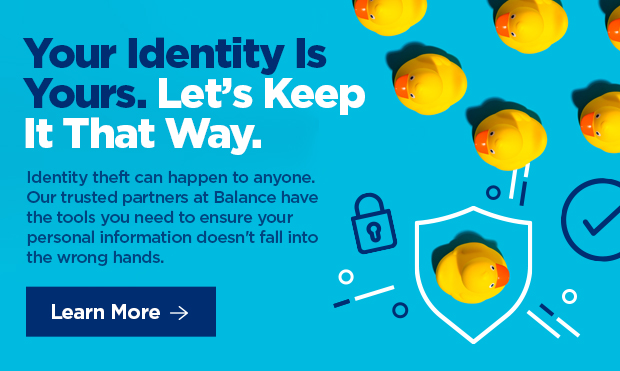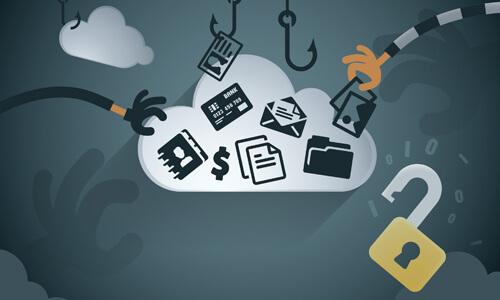Americans’ ever-growing fear of identity theft is justified: The Federal Trade Commission found that 19 people become victims of identity theft every minute. In fact, it has become so prevalent that it’s been the number one consumer complaint to the FTC for 15 years and counting.
Given how common identity theft is these days, it’s crucial to know the warning signs that your name and personal information are being used for fraudulent purposes or that your accounts have been compromised. Here are some of the most common signs that you’re a victim of identity theft:
You see unexplained withdrawals from your checking or savings account.
If you check your account transaction history online or on your bank statements often, it will be much easier to spot withdrawals that took place without your knowledge and consent. Read through the transactions carefully and be sure to report any account activity that looks unfamiliar to you.
If you see an unexplained withdrawal, you must act immediately to inform the bank of the suspicious activity and lock down your account. If someone has access to your account, they can withdraw all of the money at any time, so you must act as fast as possible. Once you report potential fraud, your bank or credit union will have its fraud team investigate and determine the proper corrective actions.
In the event you lose your debit card, you have two days to report it stolen, and your liability will be up to $50 according to Bankrate. If you report a lost or stolen debit card within 60 days of your last bank statement, your liability will be up to $500. After 60 days, you will be held liable for all losses that could have been prevented by notifying your institution earlier.
While federal protections also apply when it comes to money stolen from a bank account, it’s best to report potential fraud as soon as possible.
You see unfamiliar charges on your credit card statements.
Credit card fraud is one of the most common forms of identity theft. As the name implies, the thief uses stolen credit card information to make purchases in someone else’s name. Just like with your savings and checking accounts, keeping a close eye on your credit card statements will help you track down unfamiliar charges and prevent additional ones.
By federal law, the maximum liability you can be held to if your credit card is stolen is $50. But since you don’t want your personal information to be exposed for long, immediately after you see a suspicious charge on your statement, you should:
- Contact your credit card company. This should absolve you of liability.
- File a police report. A report will put the law on your side and entitles you to the protection of federal consumer laws.
- Contact one of the three major credit card bureaus. Ask them to put an initial fraud alert on your credit report. This alert will last for 90 days and can be renewed. Whichever one you contact will inform the other two credit bureaus of the alert.
You have debt collectors inquiring about debts you didn’t incur.
Very often, identity thieves will use the information they steal to make large purchases using credit, which you likely won’t find out about until long after. They obviously have no intention of paying it back, and since the purchase was made in your name, creditors will be expecting you to pay it off.
Your regular bills and mail stop showing up.
If your regularly delivered mail and bills suddenly stop showing up, it could mean that they’re being routed somewhere else. When this happens, contact the billing agency to ensure that your mail is being sent to your address, and if so, let them know you aren’t receiving your bills/letters.
You spot errors on your credit report.
Your credit report can and will be affected if someone has stolen your identity and is using it for personal gain. Whenever you have a chance to look at your credit report, be on the lookout for inquiries from creditors you don’t recognize or accounts opened in your name that you have no recollection of starting. Free reports from each of the three credit bureaus are available every year at annualcreditreport.com.
Your accounts are flagged for suspicious activity.
If you receive a phone call or email from your bank, credit card company or insurance provider telling you that your account has been flagged for suspicious activity, don’t just assume it’s a mistake. Follow up and start figuring out how to stop the damage before it gets worse.
Of course, if you receive such an email or phone call from one of these providers, and they solicit personal information, it may be a scam. Most legitimate businesses will never ask you to provide your account credentials or personal information unless you contact them first. Never divulge any account information or personal data until you can verify you’re talking to an actual employee. If you’re ever uncomfortable or unsure that the call is legitimate, hang up and call the company directly at their posted phone number.
You receive medical bills for procedures you never had.
Medical identity fraud is on the rise. In 2014, over one billion medical records containing personal information were stolen. As more of our medical records get digitized, it’s likely that medical identity fraud will continue to increase.
If you receive a bill from a medical provider for a procedure you’ve never had, or you are denied coverage from your insurance provider because you’ve already reached your limit, it may be a sign that someone used your information to cover their own bills.
What you should do if you think you’re a victim of identity theft:
Looking for these obvious signs that something is amiss and taking the appropriate action could potentially save you a lot of trouble in the event that your identity has been compromised. Here are some things you should do if you think you’re a victim of identity theft:
- Call one of the nationwide credit bureaus and put a fraud alert on your credit report.
- Contact your bank and credit card company and inform them of the potential fraud.
- Go to www.identitytheft.gov and click “Get Started” or call 1-877-438-4338 to file a complaint with the FTC. Be sure to include as many details about the theft as you can.
- Create an identity theft report with the FTC affidavit and keep a copy of it.
- Dispute all fraudulent accounts or transactions made in your name using the report you compiled.
- File a police report.
- Keep records of all documents and calls you have with your banks, credit card provider, the FTC and anyone else who is helping you.
- Review our identity theft checklist.
Identity theft can be devastating in so many ways, so it helps to know how you can protect yourself and your family from thieves. Being able to identify the common indicators of identity theft and knowing how to react can be the difference between getting the situation resolved in a timely manner or lasting damage to your credit score.






Comments Section
Please note: Comments are not monitored for member servicing inquiries and will not be published. If you have a question or comment about a Quorum product or account, please visit quorumfcu.org to submit a query with our Member Service Team. Thank you.